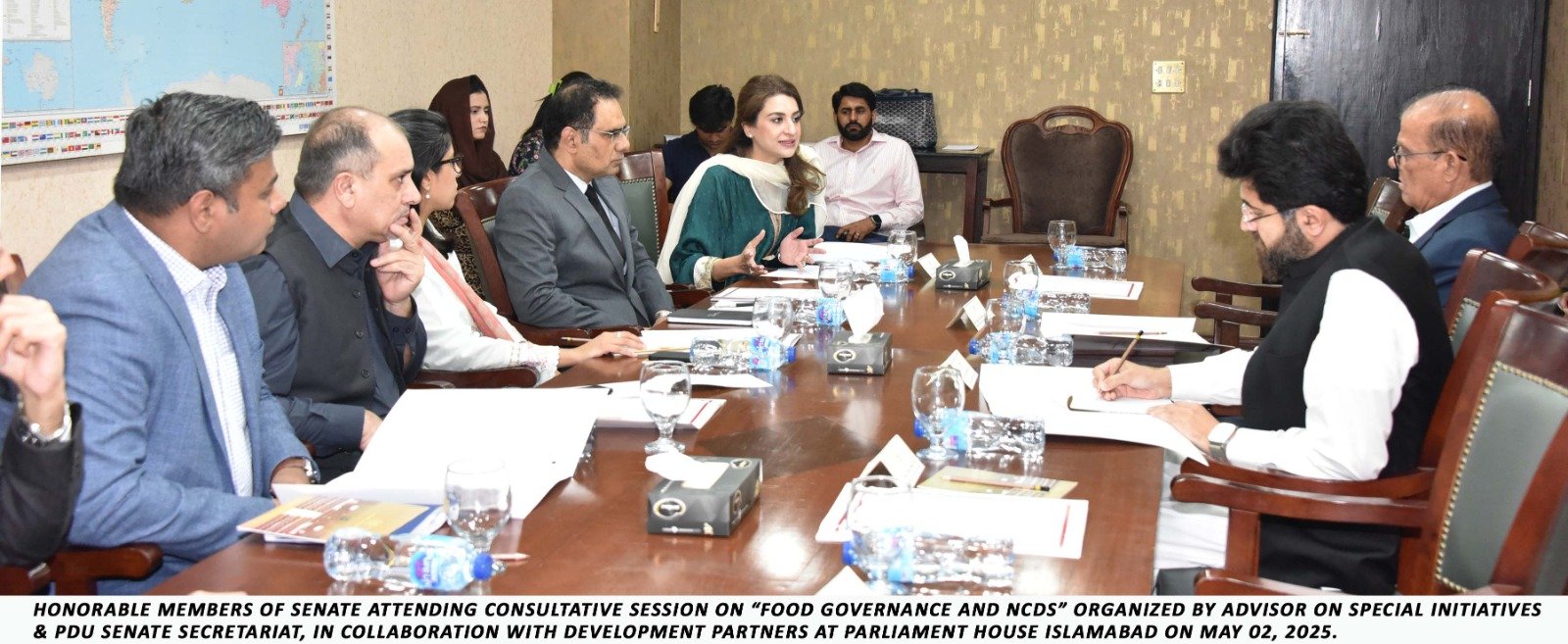Islamabad (TDI): Under the initiative, Parliamentarians for Food Governance in Pakistan, a consultative session on “Food Governance and Non-Communicable Diseases (NCDs),” was held at the Parliament House, today.
Rida Qazi, Advisor to the Chairman Senate, emphasized the urgency of addressing Pakistan’s food governance landscape, raising an urgent call to action on food safety for the nation’s 240 million people.
She highlighted the integral role of parliamentarians in ensuring that food and nutrition becomes a part of the national conversation. She outlined Chairman Gilani’s vision for the launch of a working group that will assess the growing impact of unsafe food on the collective health of the country with crucial input from the members of the Senate.
The working group will be formally launched in the coming weeks and will serve as a permanent mechanism to sustain dialogue, formulate policies, and ensure legislative oversight on food and nutrition governance
Read More: 10M Pakistanis at Risk of Acute Food Insecurity: World Bank
“We face a silent epidemic—where one population starves, while another consumes empty calories. Without urgent policy action, the health and economic costs will spiral out of control,” she said.
Organized by the PDU, Senate Secretariat, in collaboration with Impact Research International, Nutrition International, and its partners, the session brought together senators, experts, and stakeholders to chart a course for healthier food systems in Pakistan. It aimed to initiate dialogue, propose policy recommendations, and enhance accountability mechanisms within the existing food and nutrition governance landscape.
Zubair Faisal Abbasi, Executive Director of Impact Research International, briefed members of the Senate that Non-communicable Diseases (NDCs) are the leading cause of death globally. With 60% of deaths in Pakistan linked to NCDs—including heart disease, diabetes, and cancer.
He also explained that more than 40 percent of Pakistanis are obese, due to poor dietary habits and a lack of physical activity.
Read More: Pakistan, EU to Tackle Food, Climate Challenges
A representative from Novo Nordisk, Saad Tanveer, added that there are 34.5 million Pakistanis affected by diabetes, costing the economy $2.7 billion annually. He further highlighted the paradoxical nutrition crisis facing the country, where one segment of the population suffers from undernutrition and food insecurity, while another consumes unhealthy, high-calorie diets.
This dual burden, he warned, is creating a silent epidemic with far-reaching implications for public health and the economy, calling for urgent policy action and preventive strategies. Poor diets and sedentary lifestyles fuel this crisis, exacerbated by processed foods and outdated agricultural policies.
FAO’s Pakistan representative, Amna Bajwa, highlighted the deep-rooted structural flaws in Pakistan’s agriculture sector, arguing that the country’s crop choices are contributing to the national health crisis. She noted that current agricultural practices prioritize high-yield but unhealthy crops—particularly those that contribute to rising sugar levels—over more nutritious and health-friendly alternatives.
Senator Zeeshan Khanzada and Senator Masroor Ahsan expressed their full support for these initiatives. Senator Masroor Ahsan, Chairman Senate Standing Committee on National Food Security and Research, stressed the importance of addressing fundamental food security issues and called for relevant legislation to strengthen the system.
Read More: Pakistan’s Envoy to Belgium Explore Sustainable Agriculture Cooperation With COLEAD
He also expressed deep concern over the continued reliance on outdated agricultural practices in Pakistan, stating that such methods are no longer sustainable in meeting the country’s growing food demands.
Senator Zeeshan Khanzada, Chairman Senate Standing Committee Human Resource Development, expressed serious concerns over the alarming rates of malnutrition and stunted growth among children in Pakistan. He said that these issues reflect deep-rooted challenges in the country’s food and health systems, and stressed the need for immediate policy interventions to safeguard the well-being of future generations.

Sohail Majeed
Sohail Majeed is a Special Correspondent at The Diplomatic Insight. He has twelve plus years of experience in journalism & reporting. He covers International Affairs, Diplomacy, UN, Sports, Climate Change, Economy, Technology, and Health.



